JAPAN 531: Modern Japanese Literature Seminar
The Ascription of Value:
Literary Debates, 1924-39
Tuesdays and Thursdays 1:30-3:20 pm
Savery 335
Professor Ted Mack
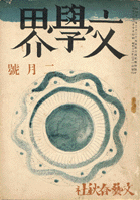
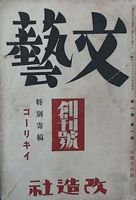
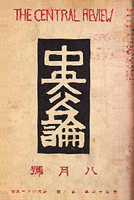
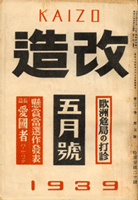
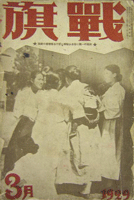
JAPAN 531: Modern Japanese Literature Seminar The Ascription of Value: Tuesdays and Thursdays 1:30-3:20 pm |
||||
 |
 |
 |
 |
 |
| Some of the journals in which the essays originally appeared: Bungakukai, Bungei, Chûô kôron, Kaizô, and Senki | ||||
This class will read a series of debates on the broad subject of literary value. These critical texts will be supplemented by a variety of supplementary material.
The class will be conducted in Japanese and therefore requires a very advanced level of Japanese speaking, listening, and reading ability. All writing will be done in English. Any student with sufficient language ability and interest, whether graduate or undergraduate, is welcome to contact us about taking the course. Course enrollment is limited and requires the permission of the professors. Please contact Professor Mack if you are interested in taking the course.
Reading Schedule
September 28 |
Introduction |
October 3 |
"Ga/Zoku bungei no kaitai (taidan)," 2-46. |
5 |
Shishôsetsu ronsô (1924-27), 1:93-119
|
10 |
Shishôsetsu ronsô, con't., 1:119-132
|
12 |
Shishôsetsu ronsô, con't.
|
17 |
Shishôsetsu ronsô, con't.
|
19 |
Suzuki Sadami, Nihon no 'bungaku' o kangaeru, 7-31 |
24 |
Suzuki Sadami, Nihon no 'bungaku' o kangaeru, 32-150 |
26 |
NO CLASS |
31 |
Suzuki Sadami, Nihon no 'bungaku' o kangaeru, 151-290 |
November 2 |
Karatani Kôjin, "Kindai Nihon no hihyô," 1:14-35. Asada Akira, Karatani Kôjin, et. al., "Taishô hihyô no shomondai," 3:177-209 |
7 |
Asada Akira, Karatani Kôjin, et. al., "Taishô hihyô no shomondai," 3:209-271 |
9 |
Midterm paper due: Student presentations |
14 |
Asada Akira, Karatani Kôjin, et. al., "Shôwa hihyô no shomondai," 1:46-112 |
16 |
Asada Akira, Karatani Kôjin, et. al., "Shôwa hihyô no shomondai," 1:112-143 |
21 |
Asada Akira, Karatani Kôjin, et. al., "'Kindai Nihon no hihyô" saikô," 3:274-356 |
23 |
HOLIDAY -- Thanksgiving |
28 |
Junsui shôsetsu ronsô (1935-36), 3:71-110
|
30 |
Junsui shôsetsu ronsô, con't., 3:111-16.
|
December 5 |
Student presentations |
7 |
Student presentations |
December 15 |
Final paper due |
Most texts will be available online. |
|
| Most of the primary readings are available through the University of Washington E-reserves. Translated texts may, of course, be read in the original. | |
| Many of the texts for this class require Adobe Acrobat Reader. | |
The following translations will not be available online: |
EXPECTATIONS and GRADING
PARTICIPATION: All class members will be expected to finish every reading before class meets. Expectations of comprehension, however, will vary by student based on his or her language ability. Native speaking students will be expected not only to have completed the reading, but also to have browsed relevant external sources. Non-native speaking specialists will be expected to have completed the reading with a good grasp of the complexities of the text. Non-native speaking, non-specialist students will be expected to have completed the reading with a firm understanding of the progression of events and the primary emotional forces at work. Since participation is a vital aspect of the class, attendance is required at all sessions. Unexcused absences will affect one's participation grade.
LEADING: All meetings of the seminar will have a student discussion leader; stories will be assigned at the first meeting. Discussion leaders will begin the class with an overview of relevant information about the story and its author including, but not limited to: biographical information about the author, historical context of the work and its production, the site and nature of the story's publication. This information should be outlined on handouts for fellow students. Discussion leaders will also be responsible for preparing 5 questions or discussion points to present to the class in order to facilitate class discussion, though not all of these questions will necessarily be used.
PAPERS: Students will be expected to write two papers of 2000 words in length during the term. (The second paper can be a 4000 word expansion of the first paper.) The goal is to produce papers that can be presented at academic conferences. The first is due on October 31, the second during the exam period on December 15. The papers should argue a coherent point based firmly in the text of stories read during the term, citing specific passages to support the argument. Specialists should also display a familiarity with relevant secondary scholarship.
GRADING: Your final grades will consider your participation (40%), your discussion leading (20%), and your papers (20% each). Though the quality of your work is central to your grade, evaluations of that quality will take into consideration individual skills. Effort will be rewarded.
STUDY GROUPS: I encourage students to meet outside of class to discuss the texts and problems they have encountered in reading those texts. Please note that this does not include dividing up the reading of a story; all students will be expected to have read all of the stories, in full.
CHEATING AND PLAGIARISM: The presentation of another's words and ideas as one's own is a serious offense; violations will be dealt with according to the University codes of conduct, which stipulate sanctions up to and including expulsion.
ACADEMIC ACCOMMODATIONS: I will do everything I can to accommodate students with particular needs. To request such an accommodation, please contact Disabled Student Services, 448 Schmitz, (206) 543-8924 (V/TTY). If you have a letter from Disabled Student Services indicating that you require such accommodation, we can discuss ways to meet those needs.
Page last updated on October 10, 2006